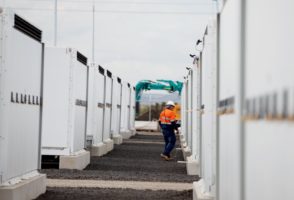Liquid fuels produced with renewable energy could be cost competitive with petrol and gasoline within the next two years, according to a new commentary published on the prospects of ‘direct air capture’ techniques that convert carbon dioxide into net zero emission fuels.
The prospects for cost competitive renewable fuels have been detailed by the founder and CEO of silicon valley start-up Prometheus, Rob McGinnis, in the academic journal Joule. Prometheus is a US-based company that is commercialising techniques for drawing carbon dioxide from the air and using it to produce liquid fuels.
“Recent breakthroughs in separations and catalysis, along with long-trend reductions in solar and wind electricity costs, have significantly increased the potential for cost-competitive renewable fuels from direct air capture (DAC) of CO2,” McGinnis says in the paper.
The “DAC” technique being developed by Prometheus captures carbon dioxide from the air and dissolves it in water. The process then uses a form of electrolysis to combine carbon and hydrogen together to produce a form of syngas.
The process, which effectively combines a form of carbon capture with the production of renewable fuel, could be a key tool in reducing emissions in the transport sector.
“This is an important development because there is little time available to reduce CO2 emissions sufficiently to avoid the worst effects of climate change.”
McGinnis argues that zero-emission liquid fuels will be necessary for the decarbonisation of the global economy. McGinnis notes that while the electrification of transport is gaining momentum, liquid fuel replacements may be necessary for situations were electric alternatives are not yet feasible, such as aviation.
“Electrification of the global vehicle fleet, which now totals over one billion cars and trucks, or conversion of vehicles to use novel fuels like hydrogen, cannot proceed quickly enough to address the climate crisis,” McGinnis adds.
“Replacing fossil-fuel gasoline, diesel, and jet fuels would be able to proceed at a much faster pace, because it does not require the replacement or retrofit of the existing vehicle fleet. In order for this fuel replacement to occur, however, renewable fuels must offer the same or better performance than fossil fuels at the same or lower price.”
Transport fuels are responsible for around one-sixth of the world’s human-caused greenhouse gas emissions, and finding a zero-emissions alternative will be necessary to achieve a global goal of net zero emissions by mid-century under the Paris Agreement.
Key to the success of renewable fuels, McGinnis says, are breakthroughs in three core that are used in the renewable fuel production process.
These include advances in the carbon dioxide electrolysis process to improve efficiency, improvements in the process to separate the syngas from the water used to produce it and upgrades in the processes to convert the syngas into petrol, diesel and jet fuel equivalents.
“These advances together allow for inexpensive systems that can make true gasoline, diesel, and jet fuels from atmospheric CO2,” McGinnis says.
McGinnis believes the production process can be responsive to the needs of the electricity system, ramping up or down production and electricity use as needed, serving as a key balancing tool in the electricity system.
“One practical advantage of non-thermal processes using only renewable electricity is that they can be turned on and off quickly to match intermittent supplies of renewable power. This is much better suited to the availability of renewable energy sources than thermal processes that must run 24/7 for stable operation,” McGinnis says.
This ability would mirror similar advantages of the production of renewable hydrogen that have been advocated by several key players in the energy market, including ARENA CEO Darren Miller, who see the production of zero-emission fuels as a way to both tap into a massive export market for energy as well as strengthening Australia’s own energy system.
McGinnis says that if the technical innovations can be demonstrated successfully, the remaining challenge will be to scale up the production of renewable electricity to meet the demand needed to match the supply of fossil fuels.
“In order to replace all fossil gasoline in the United States, assuming 66% resource availability and a 60 per cent conversion efficiency, an additional 1.4TW of combined solar and wind capacity for the United States alone will be required,” McGinnis says.







